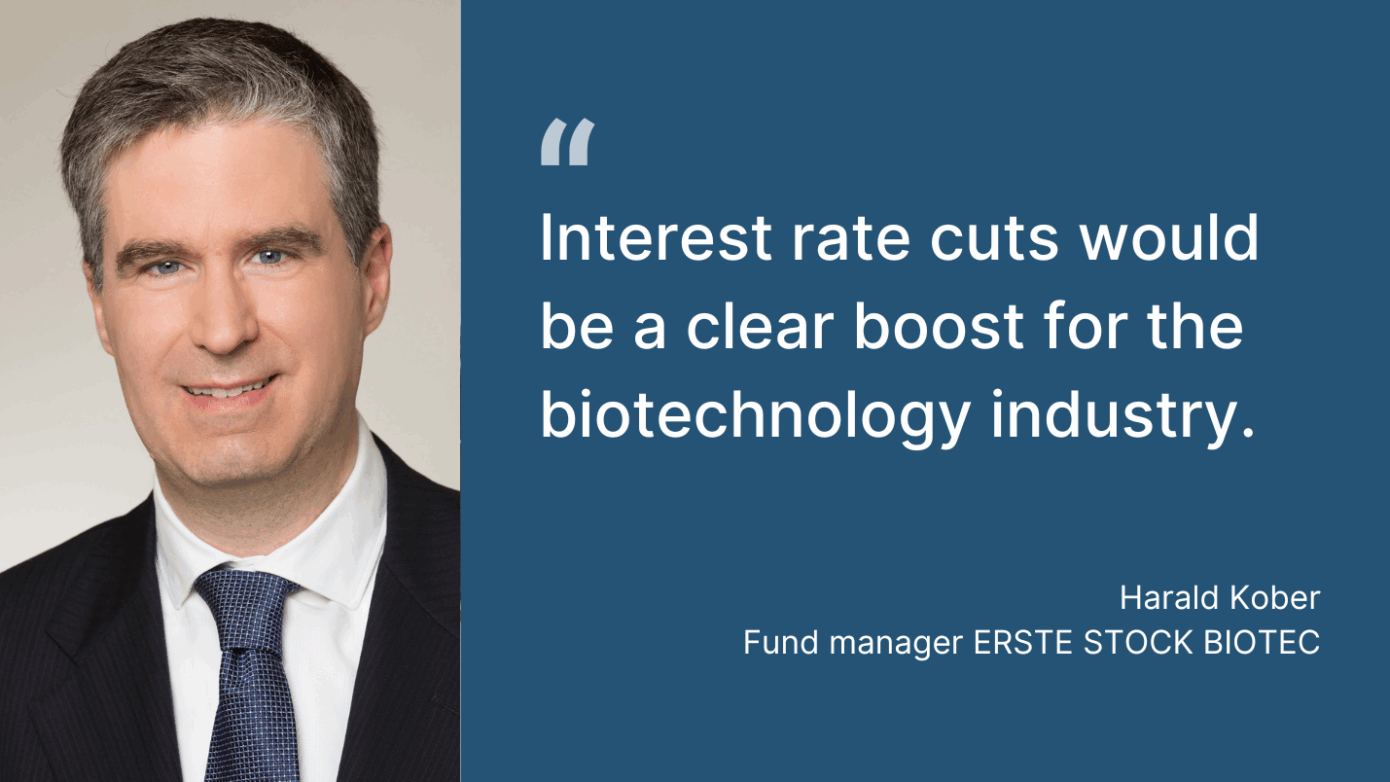Interview with fund manager Harald Kober (ERSTE STOCK BIOTEC)
🧪 What is biotechnology?
Biotechnology involves the use of organisms (e.g. bacteria, fungi and cell cultures) or their components (e.g. enzymes and other proteins) for technical processes.
Where is biotechnology used?
There are many applications for biotechnology: in medicine, antibodies are produced for the diagnosis and treatment of diseases. In agriculture, crops are bred for higher yields and resistance to pests and diseases. Biotechnology is also an important part of the development of biofuels, which are produced from renewable resources. In environmental technology, certain biotechnological applications contribute to soil or wastewater remediation.
How will the revenues and profits of global biotech companies develop until 2030?
Most biotech companies are based in the US. For large, profit-generating companies, there are consensus estimates that assume mid-single-digit percentage growth in profits. Growth rates are currently somewhat sluggish due to threats by the Trump administration to intervene massively in pricing if companies do not take action themselves. This has a direct impact on profitability and profits. Added to this is the dispute over generic drug imports and possible tariffs, which also affect US companies: around 85 per cent of production ingredients come from abroad. These could become more expensive.
Note: Prognoses are note a reliable indicator for future performance.
Which countries could come under particular pressure from the US government’s tariffs?
Switzerland is one example, although it is home to large pharmaceutical companies. In other parts of Europe, there are smaller biotech players that would also be affected. If you combine the appreciation of the euro and the tariffs, you arrive at a potential cost increase of around 30 per cent. That is significant – even if exchange rates fluctuate and could move in a different direction again. The US government’s response to investments by European companies in research and production in the US remains to be seen. Trump has announced that he will initially introduce moderate tariffs, which could rise significantly in a year and a half. The media has already mentioned figures of up to 200 per cent.
What other challenges does the industry face?
Government health budgets are tight, both in Europe and in the US. In the US, for example, political decisions have been made to discontinue government support for certain mRNA vaccines. Trump has also written a letter to the largest pharmaceutical companies asking them to submit proposals for price reductions. If they fail to do so, he is threatening to regulate prices based on the lowest prices worldwide. This is part of his negotiating tactic: first apply pressure, then find compromises.
How much of a burden are generic drugs on established companies?
Generic drugs come about when patents expire. This is only a problem for companies if they are unable to develop new, better drugs. As long as innovations continue to emerge – more efficient and with fewer side effects – they have a clear raison to be here compared to generic drugs. This broadens the market, but also makes it more demanding.
Why do US companies dominate the biotech sector? Are there any new players in Europe?
The dominance of the US has grown historically and is also reflected in the investments of ERSTE STOCK BIOTEC. Although there are smaller companies in Europe, the major impetus comes from the US. Recently, there have been mixed results for European pharmaceutical giants such as Novo Nordisk. Its competitor Eli Lilly has recently experienced price fluctuations, initially due to disappointing study results for a new weight-loss pill, whose effectiveness fell short of expectations. However, new study data with improved results recently caused the share price to rise. The pipeline is crucial, and this is where smaller, innovative biotechnology companies are making increasing progress.
Note: The companies listed here have been selected as examples and do not constitute investment recommendations. In active management, the portfolio positions mentioned may change at any time. There is no guarantee that securities will remain in the portfolio. An investment in securities involves both opportunities and risks.
What role does obesity play for the fund?
We focus on innovative companies with promising products in the pipeline. One example is Viking Therapeutics: the Phase 2 study of a weight loss pill showed good efficacy, but also increased side effects, especially at higher doses. The study discontinuation rate was significantly higher than for comparable active ingredients, which may have been due to the rapid increase in dosage. Further studies are now testing a more cautious dosage increase to improve tolerability.
What other areas of application are of interest to ERSTE STOCK BIOTEC?
In addition to obesity, rare diseases are an exciting field: there is little competition and high pricing power. Oncology is also relevant, but with a lot of competition and high dynamics. Another interesting area is eye diseases such as macular degeneration, cataracts and glaucoma. We expect interesting study results in this area in the next 12 to 18 months.
One example of a company in this segment is Ocular Therapeutics. The company focuses on developing long-acting delivery systems to reduce the burden of frequent injections, particularly for conditions such as wet AMD (disease of the blood vessels in the eye) and diabetic macular oedema (damage to the retina caused by diabetes).
What distinguishes successful biotech companies from less successful ones?
Two things: a superior product and strong management. The best drug is useless if management fails to get it approved or markets it poorly. Product and management must go hand in hand – that is crucial for success.
What are you currently looking for in particular when making new investments?
We are looking for opportunities with a good product, strong management and attractive valuations. It’s not about buying at the top but getting in when there are setbacks – when others no longer believe in it. Then you can reap the rewards with the “luck of the brave”.
Note: Investments in securities involve risks and opportunities.

What could give biotech stocks a boost in the next five years?
A more efficient FDA (US Food and Drug Administration, note) that makes decisions faster would be an advantage. Planning security in pricing is also important, such as guaranteed pricing power for particularly efficient drugs. And, of course, a favourable interest rate environment: interest rate cuts in the US would be a clear tailwind for the industry.
🧬 How can you invest in biotechnology?
The biotechnology industry offers investors a wide range of investment opportunities in companies involved in the development of new drugs, diagnostics, genome analysis and other biotechnology products. It should be noted that shares in biotechnology companies carry a higher risk than other sectors due to high research and development costs, strict regulatory requirements and uncertainty regarding the approval of new products.
Investment funds such as ERSTE STOCK BIOTEC spread the risk across a large number of promising stocks. Among the best-known biotech companies are Gilead Sciences, Vertex Pharmaceuticals and AstraZeneca.
👉 Read more about the fund on our website
The fund employs an active investment policy. The assets are selected on a discretionary basis. The fund is oriented towards a benchmark (for licensing reasons, the specific naming of the index used is made in the prospectus (12.) or KID “Ziele”). The composition and performance of the fund can deviate substantially or entirely in a positive or negative direction from that of the benchmark over the short term or long term. The discretionary power of the Management Company is not limited.
For further information on the sustainable focus of ERSTE STOCK BIOTEC as well as on the disclosures in accordance with the Disclosure Regulation (Regulation (EU) 2019/2088) and the Taxonomy Regulation (Regulation (EU) 2020/852), please refer to the current Prospectus, section 12 and the Annex “Sustainability Principles”. In deciding to invest in ERSTE STOCK BIOTEC, consideration should be given to any characteristics or objectives of the ERSTE STOCK BIOTEC as described in the Fund Documents.
Legal disclaimer
This document is an advertisement. Unless indicated otherwise, source: Erste Asset Management GmbH. The language of communication of the sales offices is German and the languages of communication of the Management Company also include English.
The prospectus for UCITS funds (including any amendments) is prepared and published in accordance with the provisions of the InvFG 2011 as amended. Information for Investors pursuant to § 21 AIFMG is prepared for the alternative investment funds (AIF) administered by Erste Asset Management GmbH pursuant to the provisions of the AIFMG in conjunction with the InvFG 2011.
The currently valid versions of the prospectus, the Information for Investors pursuant to § 21 AIFMG, and the key information document can be found on the website www.erste-am.com under “Mandatory publications” and can be obtained free of charge by interested investors at the offices of the Management Company and at the offices of the depositary bank. The exact date of the most recent publication of the prospectus, the languages in which the fund prospectus or the Information for Investors pursuant to Art 21 AIFMG and the key information document are available, and any other locations where the documents can be obtained are indicated on the website www.erste-am.com. A summary of the investor rights is available in German and English on the website www.erste-am.com/investor-rights and can also be obtained from the Management Company.
The Management Company can decide to suspend the provisions it has taken for the sale of unit certificates in other countries in accordance with the regulatory requirements.
Note: You are about to purchase a product that may be difficult to understand. We recommend that you read the indicated fund documents before making an investment decision. In addition to the locations listed above, you can obtain these documents free of charge at the offices of the referring Sparkassen bank and the offices of Erste Bank der oesterreichischen Sparkassen AG. You can also access these documents electronically at www.erste-am.com.
Our analyses and conclusions are general in nature and do not take into account the individual characteristics of our investors in terms of earnings, taxation, experience and knowledge, investment objective, financial position, capacity for loss, and risk tolerance. Past performance is not a reliable indicator of the future performance of a fund.
Please note: Investments in securities entail risks in addition to the opportunities presented here. The value of units and their earnings can rise and fall. Changes in exchange rates can also have a positive or negative effect on the value of an investment. For this reason, you may receive less than your originally invested amount when you redeem your units. Persons who are interested in purchasing units in investment funds are advised to read the current fund prospectus(es) and the Information for Investors pursuant to § 21 AIFMG, especially the risk notices they contain, before making an investment decision. If the fund currency is different than the investor’s home currency, changes in the relevant exchange rate can positively or negatively influence the value of the investment and the amount of the costs associated with the fund in the home currency.
We are not permitted to directly or indirectly offer, sell, transfer, or deliver this financial product to natural or legal persons whose place of residence or domicile is located in a country where this is legally prohibited. In this case, we may not provide any product information, either.
Please consult the corresponding information in the fund prospectus and the Information for Investors pursuant to § 21 AIFMG for restrictions on the sale of the fund to American or Russian citizens.
It is expressly noted that this communication does not provide any investment recommendations, but only expresses our current market assessment. Thus, this communication is not a substitute for investment advice.
This document does not represent a sales activity of the Management Company and therefore may not be construed as an offer for the purchase or sale of financial or investment instruments.
Erste Asset Management GmbH is affiliated with the Erste Bank and austrian Sparkassen banks.
Please also read the “Information about us and our securities services” published by your bank.

